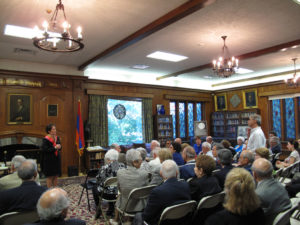
By Thomas C. Nash
Mirror-Spectator Staff
BOSTON — US Ambassador to Armenia Marie Yovanovitch made several appearances in the Boston area last week, answering pointed questions from journalists and the community on Armenian Genocide recognition and aid reduction to Armenia.
Yovanovitch’s appearances, her first in Boston since being named as ambassador to Armenia, included a breakfast with the Armenian International Women’s Association (AIWA) at the Armenian Library and Museum of America and a speech at the Armenian Cultural Foundation (ACF) on June 19. She also met with Gov. Deval Patrick.
The events were part of a multi-city tour that Yovanovitch said was aimed at creating a dialogue with the Armenian-American community. Other cities on the tour included New York, Los Angeles and Washington.
“The purpose of my trip is to share with people the views that we have about what’s going on in Armenia now, to share a little bit about the US-Armenia relationship, as well as the many positive things that the US government is doing in Armenia,” Yovanovitch said at a press conference in Watertown at the Mirror-Spectator office.









